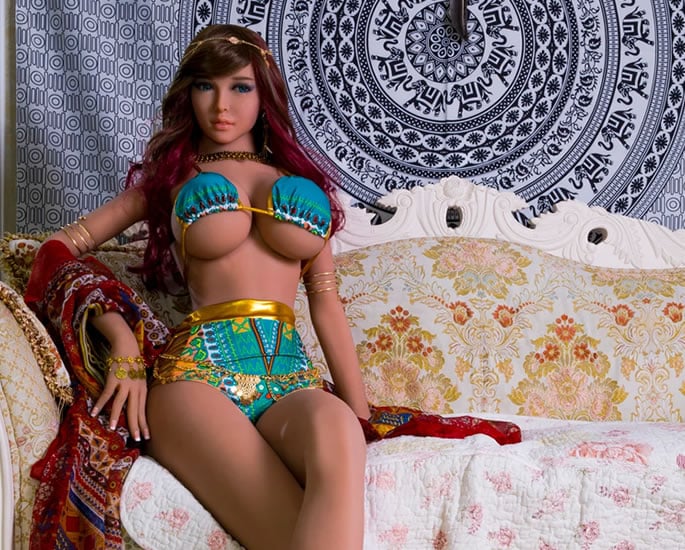"A sex doll, however, symbolises autonomy of fantasy."
In India, sex toys have become normalised, but the rise of sex dolls has led to whether the country is ready for them.
For decades, sexual pleasure was whispered about behind closed doors.
It is now openly discussed and endorsed.
But as these hyper-realistic, human-like companions become more visible, questions arise about intimacy, ethics, and desire.
The sex toy market is booming, yet sex dolls push the conversation into uncharted territory.
We look at the legal, cultural, and psychological implications while asking whether India is truly ready for sex dolls.
Are Sex Dolls Available in India?

For those curious about the availability of sex dolls in India, the answer is a blend of accessibility and ambiguity.
They are indeed available, but their legal status exists in a murky grey area.
There is no specific law that explicitly bans the manufacture, sale, or possession of sex dolls.
However, the legal framework that governs them is largely based on colonial-era obscenity laws, primarily Section 292 of the Indian Penal Code. This law prohibits the sale and distribution of “obscene” materials, but the term “obscene” is left open to subjective interpretation.
This ambiguity creates a challenging environment for businesses and consumers alike.
The practical implication of this legal limbo is that while you are unlikely to find a sex doll prominently displayed in a storefront, a discreet and burgeoning online market is thriving.
E-commerce platforms have become the primary channel for the sale of sex dolls, often using euphemisms like “massagers” or “mannequins” to navigate cultural and legal sensitivities.
These online retailers prioritise discreet packaging and delivery, ensuring a degree of privacy for their customers.
Importing sex dolls can be a gamble. Customs authorities have the power to seize products they deem to be obscene under the Customs Act of 1962, which restricts items that are considered to be against public decency.
However, personal importation isn’t outright prohibited, and the enforcement of these regulations can be inconsistent.
This has led to a situation where some individuals successfully import dolls, while others have their purchases confiscated.
Despite these hurdles, the demand for sex dolls is on the rise.
Online retailers report a significant increase in sales, with a customer base that is not limited to metropolitan areas.
This growing interest suggests that, regardless of the legal and social obstacles, a segment of the Indian population is actively seeking out these products.
Sex Toys vs Sex Dolls

While conversations around sex toys in India have become increasingly normalised, with many couples even incorporating them into their intimate lives to enhance pleasure, the introduction of a sex doll into the equation often elicits a different, more emotionally charged reaction.
This is because a sex doll transcends the functionality of a simple toy; it touches upon the complex and often fragile boundaries of emotional intimacy.
Psychotherapist Dr Chandni Tugnait said: “A sex toy is often seen as an accessory within intimacy, something shared or mutually explored.
“A sex doll, however, symbolises autonomy of fantasy. It introduces a third presence that can feel more humanlike, and therefore, more emotionally charged.”
This human-like quality is what can create feelings of confusion, insecurity, and even betrayal for a partner. It blurs the line between self-pleasure and what might be perceived as a pseudo-relationship.
The discomfort, as Dr Tugnait points out, often stems from a fear of being replaced or the idea that intimacy is being “outsourced”.
The key to understanding this dynamic is to decode what the doll represents in the partner’s emotional world.
She added: “For some, it’s about novelty, curiosity, or physical expression without emotional risk. For others, it could signal unmet emotional or sexual needs.”
The emotional weight of a sex doll, therefore, is far greater than that of a vibrator or a dildo, and it necessitates a more nuanced and open conversation between partners.
What is the Intent?

Discovering that a partner owns a sex doll can be a jarring experience.
The immediate emotional response might range from shock and confusion to deep-seated hurt. It is a scenario that can easily trigger feelings of inadequacy and jealousy.
However, jumping to conclusions is something to avoid.
Dr Tugnait said: “The instinct might be to take it personally but it’s important to pause and ask what the doll represents rather than what it replaces.”
For some individuals, the motivation for purchasing a sex doll may be rooted in curiosity, a desire to explore fantasies in a safe and private space, or even performance anxiety.
In these cases, the doll is not a reflection of a partner’s shortcomings but rather a tool for personal exploration.
However, transparency is crucial.
Dr Tugnait elaborated:
“Secrets around sexual behaviour, even if harmless in intent, can erode trust because intimacy thrives on emotional safety, not surprises.”
The act of hiding a sex doll from a partner is often more damaging than the presence of the doll itself. It creates a breach of trust that can be difficult to repair.
The healthiest approach, should such a discovery be made, is to opt for curiosity over confrontation.
Asking a partner, “Help me understand what this means for you,” can open the door to a dialogue rather than building a wall of resentment.
It allows for an honest conversation about desires, boundaries, and any unmet needs that may exist within the relationship.
Communicating Boundaries

The introduction of a sex doll into a relationship, whether it is a shared discovery or a personal one, necessitates the establishment of clear and mutually agreed-upon boundaries.
These boundaries are not about control but about ensuring the emotional safety and well-being of both partners.
Dr Tugnait advised: “Couples should talk about comfort levels.
“Is the doll private or shared? Does it replace or supplement intimacy? Are both partners emotionally okay with its presence?”
If one partner feels threatened or displaced by the doll, these feelings need to be validated and addressed, not dismissed.
Open and honest communication is the cornerstone of navigating this new and complex terrain.
It can be helpful to establish that the doll is a tool for fantasy and not a substitute for a genuine human connection.
Dr Tugnait emphasises the importance of four guiding principles: consent, communication, context, and continual check-ins.
Both partners need to consent to the presence of the doll in their lives, communicate openly about their feelings and boundaries, understand the context in which the doll is being used, and regularly check in with each other to ensure that the arrangement is still comfortable for both.
The conversation around sex dolls in India is still in its infancy, and it is one that is likely to be met with a mixture of intrigue, apprehension, and moral debate.
The legal landscape remains undefined, and societal acceptance is far from widespread. However, the quiet growth of the online market for sex dolls is a clear indication that a shift is underway.
As with any new and disruptive technology, sex dolls are forcing us to confront and re-evaluate our understanding of intimacy, desire, and the very nature of relationships.
They challenge us to have conversations that are often uncomfortable but ultimately necessary for navigating the evolving landscape of human connection.
The future of intimacy is being rewritten, and whether we are ready for it or not, the narrative now includes a new and silent character: the sex doll.






























































